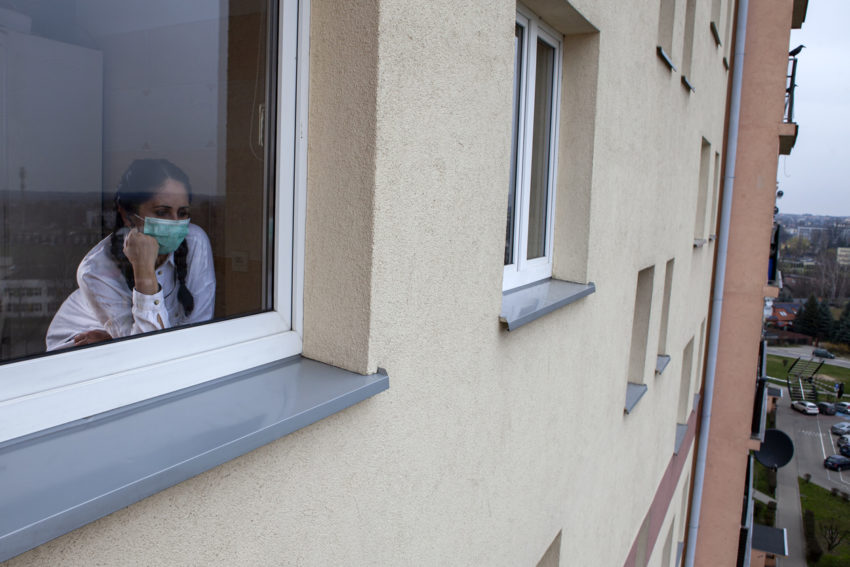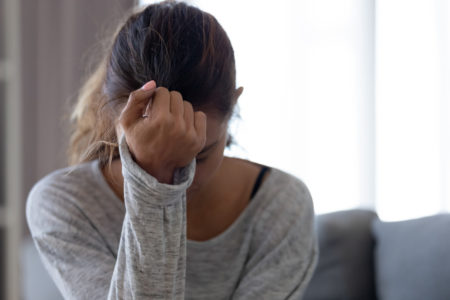
Share On Social!
The current novel coronavirus afflicts more than just the lungs.
For Latinos and other people of color, COVID-19 has caused disproportionately higher rates of cases and death, job loss, and other inequitable impacts.
These groups are also experiencing more mental health issues than in previous eras, according to Dr. Madeline Aviles-Hernandez, the Outpatient Services Director at the Gándara Center.
“This crisis is making life much more difficult for [Latinos, African-Americans and other culturally diverse populations] we serve, including those in recovery and people who have yet to be treated for such problems as anxiety and depression,” Aviles-Hernandez said in a statement. “Minorities have been—and continue to be—less likely to receive mental health treatment.”
Mental Health Complications Caused by Coronavirus
The COVID-19 outbreak has resulted in forced isolation, school and business closure, massive job loss, food insecurity, and a litany of other impacts outside of the illness itself.
These ramifications impact more than just physical health, but mental wellness, too, according to Cathi Tillman, the executive director and founder of La Puerta Abierta — a Philadelphia nonprofit providing mental health support to immigrant and refugee communities.
“People who were supporting themselves on some level now can’t,” Tillman told the Philadelphia Inquirer. “They’ve lost their jobs. They can’t congregate socially, or go to church, which is a big part of the community for many people. They can’t come into the office for therapy. For recent immigrants and refugees, the things that were already difficult are 100% more difficult now.” 
Moreover, people of color are reporting that this pandemic is impacting their state of mind.
Recent U.S. Census Bureau data shows that from May 28 to June 2 feelings of “not being able to stop or control worrying,” were as high as:
- 62% among Black Americans
- 59% among Asian Americans
- 63% among Latinos
- 51% among white Americans
Another recent poll found that over 20% of Latinos say they are suffering increased anxiety due to the virus and lockdown. 15.7% say they suffer from increased stress.
Without a dedicated response, one unseen in previous years, from civic leaders that aims to specifically address the issues impacting Latinos and other minority groups, these issues will persist.
Historic Lack of Access to Mental Health Services
While the virus is highlighting most flaws in many of America’s systems, disadvantaged groups’ access to necessary resources is nothing new.
The systemic injustice Black and Brown people continue to face today has caused widespread, generational trauma, according to Dr. Pamela Montano, a board member of the American Society of Hispanic Psychiatry and the officer of infrastructure and advocacy for the Hispanic Caucus of the American Psychiatric Association
“The COVID pandemic has highlighted the structural inequities that affect the Latino population [both] immigrant and nonimmigrant,” Montano told MedScape. “This includes income inequality, poor nutrition, history of trauma and discrimination, employment issues, quality education, access to technology, and overall access to appropriate cultural linguistic health care.”
Worse, and like so many other forms of healthcare, there has been a historic lack of available mental health services in communities of color. Latinos are more likely than their peers to have mental health issues, which often go unaddressed and untreated, according to a Salud America! research review.
Over the years, research has gone to show the deep impacts of these facts.
A study in Health Affairs found that health disparities in disadvantaged areas have a direct link to mental health. 
“In general, minorities, particularly African Americans, have poorer health and health outcomes than do [white people],” the study’s authors write. “Although Hispanics and [black individuals] [have a] lower risk of having a psychiatric disorder as compared with their white counterparts, those who become ill tend to have more persistent disorders.”
Due to the murder of George Floyd, millions have taken to the streets calling for systematic change in this country. One of the areas they are calling to address is the gaps found in the healthcare system.
“In Latino communities, like in other communities of color, there are continued gaps in folks having access to behavioral health services,” Michael Consuelos, the senior medical adviser for the behavioral-health platform NeuroFlow, told the Philadelphia Inquirer. “There aren’t as many providers in the community, and there are continued issues around stigma. There’s good evidence to show that all that was happening before COVID.”
Listen to the Salud Talks podcast and our episodes on mental health during the coronavirus pandemic!
- Salud Talks podcast Episode 25, “Mental Health and the Global Pandemic“
- Salud Talks podcast Episode 26, “Mindfulness During an Epidemic“
Check out these 10 steps to boost access to mental health services among Latinos!
Explore More:
Mental HealthBy The Numbers
142
Percent
Expected rise in Latino cancer cases in coming years




I know this is a two year old article, but Bias is another reason why some Hispanic people think about or attempt suicide. I’m actually part Filipino, German and English and I ended up looking stereotypically Hispanic and my surname is Spanish due to my Filipino side since the Spanish colonized the Philippines. I’m a woman though and I’ve thought about it for a number of reasons involving my health from a rare disorder that caused learning issues and also I have obvious cancer symptoms Ive tried getting help with. I’ve also been treated poorly and sometimes in very scary situations because of obvious Bias and Prejudice due to my appearance. I’m just saying Bias against people who are Hispanic and “look Hispanic” is a real thing. I apologize if it was in this article but I didn’t notice it, But I do apologize if its in there. I just think it needs to be addressed more. Thank You